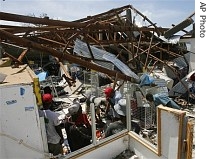2007年VOA标准英语-UNICEF: Children Most Affected by Cyclone Favio(在线收听)
Geneva
24 February 2007
The U.N. Children's Fund says children account for half of the estimated 120,000 people made homeless by severe flooding in central Mozambique and a subsequent cyclone. Lisa Schlein reports for VOA from Geneva.
 |
| Residents salvage goods from a department store in the Mozambique coastal town of Vilankulo, 24 Feb 2007 |
Initial reports indicate that strong wind seriously damaged crucial public facilities. The U.N. Children's Fund says the wind blew away the roof of several hospitals and schools in the town of Vilankulos, which was first hit by the cyclone on the mainland.
UNICEF spokesman Damien Personnaz says children are always the most vulnerable in situations of distress.
"When you have these kinds of emergencies and heavy flooding, it means that the food distribution is totally disrupted. It means that the living conditions are not good at all," he said. "It means that they are to be gathered in emergency shelters, where it is a pretty crowded situation. The lack of clean water and the lack of proper sanitation will, without any doubt, weaken their already weak body."
Personnaz says children are particularly vulnerable to diseases and malnutrition. He says illnesses already have broken out in the overcrowded temporary shelters. The most common are diarrhea, malaria and conjunctivitis.
The areas affected by the floods also are hardest hit by the AIDS pandemic. UNICEF says people who are weakened by this disease are less able to cope with the blow of a natural disaster.
Personnaz says UNICEF has sent three teams into the area to assess the situation.
"The assessment teams actually are not only assessing the needs, but also providing very much needed relief supplies," he added. "We know already what kind of supplies we need. What we do not really know yet is the scale and the scope of the emergency."
UNICEF is appealing for $5 million to deal with the crisis, which it expects will continue for at least six months. It says main needs include safe water, health supplies and basic medicines for women and children. It says it needs to provide good sanitary facilities to head off disease epidemics.